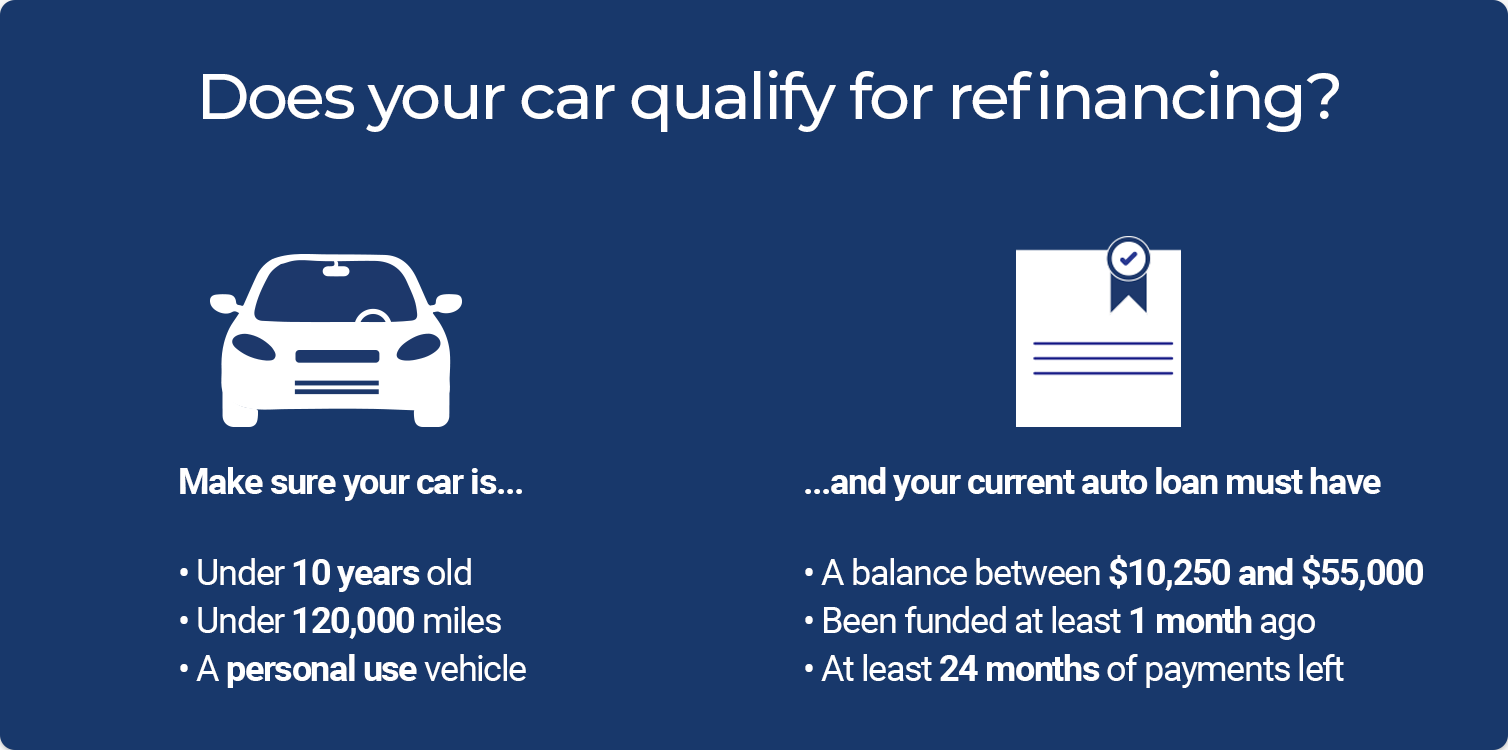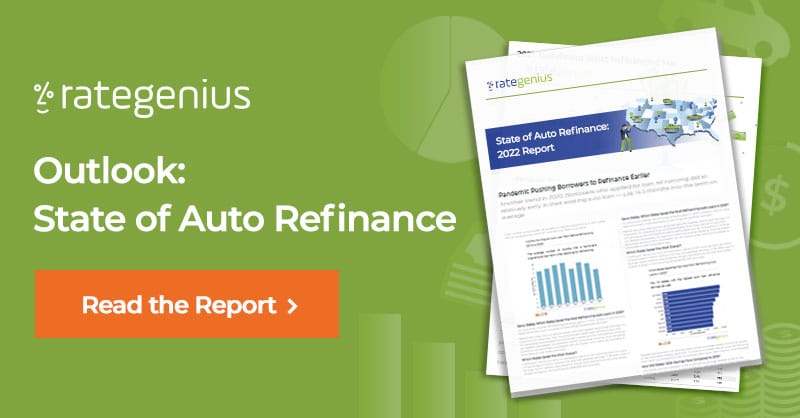In 2020, borrowers refinanced their car loans earlier into their term, the lowest since 2013.
Last year was a big year for auto loan refinancing. Nearly all states registered more auto loan refinance applications, and 16% more Americans applied for refinancing in 2020 compared to 2019. Borrowers also chose to refinance their car loan earlier into their loan term than years past, all according to RateGenius’s State of Auto Refinance report.
On average, Americans applied to refinance their car loan 14.5 months into their original auto loans in 2020, the earliest time on record. 2017 was the second-earliest year, when borrowers refinanced 16.2 months into their loan.
What inspired car owners to refinance sooner in 2020? We turned to our report and other industry data for an explanation.
4 Reasons Borrowers Are Refinancing Car Loans Sooner
It was a combination of factors that motivated car owners to refinance loans earlier into their term.
1. People are taking advantage of low interest rates.
The fed funds rate underwent multiple cuts in 2020. When the Fed Funds rate drops, auto loan rates also trend downward, which made last year an opportune time for Americans to hunt for a deal.
For those who qualified, the decision to refinance paid off. In 2020, the average interest rate on original loans was 10.4%, while the average rate on a refinanced loan was 5%.
That 5.6% rate difference between the average original loan rate and average refinance rate is the greatest rate drop seen in the last eight years.
2. Average auto refinance savings are nearing $1,000 per year.
On average, Americans who refinanced in 2020 secured $989.72 in annual savings, the highest seen since 2016. Over a 65-month term (the average auto loan term for a used car according to Experian), that amounts to over $5,300 in savings over the life of the loan.
That said, annual savings varies by factors like your state, credit, and even car type. Borrowers who refinanced pickup trucks saw the most savings, with the average savings being $1,138 per year. On average, SUV owners saved $976, van owners saved $970, sedan owners saved $931, and hatchback owners saved $919.
3. Borrowers are looking for a way to reduce monthly payments.
For most buyers, the annual savings from refinancing a car is the icing on the cake; what they’re really after is a lower monthly bill. According to a TransUnion 2020 auto refinance report, 86% of people who refinance are payment shoppers.
In 2020, borrowers could have been motivated to explore refinancing sooner than later due to pandemic-caused financial uncertainty. An extra $100 secured from refinancing could have been enough to cover another bill or a week of groceries at a time when millions were facing unemployment, furloughs, or hour cuts at work.
4. Lenders are more interested in offering auto refinancing, though some could still struggle to get approved.
Credit unions hold the majority of the market share in car loan refinancing, 69% in the first quarter of 2020. However, auto loan refinancing made up just 4.5% of all auto loan originations, according to TransUnion data. That means there is a lot of opportunity for lenders hoping to grow their portfolios.
Lenders see value in offering auto loan refinancing too because these borrowers have a better risk profile. They’re typically considered low risk because they have an established payment history as well as collateral backing the loan. If you’re paying off your original car loan as agreed, there’s a good chance you’ll pay off your new, better car loan too.
Keep in mind that auto refinance qualifying criteria can be more stringent than when taking out the original auto loan. That’s because lenders are looking at you, your current auto loan, and your vehicle. In 2020, the average credit score of all refinance applicants was 657, but the average credit score of those approved was 721. Aside from looking at your credit score, lenders want to see proof of stable employment, which could be tough for those who experienced unemployment during the pandemic.
Your loan-to-value (LTV) will need to fall within your lender’s underwriting guidelines. The maximum LTV is typically 125% to 130% of the car’s retail value. If you have a high LTV, you may be required to put a down payment on the loan to lower it, or you may not be approved at all.
Should Borrowers Refinance Their Car Loan?
Car loan refinancing is a way to lower your interest rate by paying off your old loan with a new one that has a better interest rate. While this can lead to monthly and long-term savings, here are a few factors borrowers should consider before applying for one, even when rates are low.
Fees
Car loan refinancing typically comes with origination fees, which is a percentage of the loan amount you pay upfront or roll into the loan. Another fee to watch out for is a prepayment penalty on your existing loan. This is a fee your existing lender might charge for paying off the original loan early. If the fees involved in refinancing a car cost you more than what you save, refinancing may not be worthwhile.
Car loan term
Taking out a new loan with a longer loan term could reduce your monthly payment, but it could also cost you more in interest. Plus, extending your loan term puts you at risk of going upside down.
If the car depreciates faster than you pay off the loan balance, you could end up with negative equity, which is when you owe more than the car is worth. Negative equity can make it difficult to sell or trade-in your car. And if you total your car while upside down, you could be responsible for paying the difference between your car’s value and the loan, unless you have a GAP waiver or insurance.
Vehicle age
Not all cars qualify for car loan refinancing. Lenders may only accept cars of a certain age and with a certain number of miles. Older cars may also have a higher LTV because of depreciation, so it’s a good idea to calculate your LTV before applying.

How to Shop for Car Loan Refinancing
If you’re considering refinancing your car loan, here are steps to take next:
1. Check your credit
You can pull your FICO credit score and report for free with Experian to see where you stand. If your score is below 700, paying off revolving debt could be a way to improve your score before applying for car loan refinancing.
2. Calculate your DTI
Your DTI ratio represents how much of your monthly income is going to monthly debt payments. You can use the calculator below to calculate your DTI. Bringing your DTI below 30% could improve your chances of qualifying for car loan refinancing.
(DTI) Debt-to-Income Ratio Calculator
Your debt-to-income ratio, or DTI, is a percentage that compares your monthly debt payments to your gross monthly income.
Many auto refinance lenders have a maximum DTI of around 50%. However, if you're applying for a mortgage, lenders prefer a DTI under 36%.
3. Calculate your LTV
Your LTV is another factor lenders will review to determine if you qualify for car loan refinancing. In general, the maximum LTV is 125% to 130% for an auto loan refinance, however, lower is better.
Car (LTV) Loan-to-Value Calculator
A loan-to-value ratio over 100% means you owe more on your loan than your vehicle is worth. An LTV over 125% can make it harder, but not impossible, to qualify for a refinance loan.
If your LTV is less than 100%, your car's value is higher than what you owe on your loan. The lower your LTV, the better.
4. Shop around
Once you know your numbers, shop around with multiple lenders to see what they might be able to offer. Review the overall costs of the loan given the interest rate and length of the loan term to decide which loan is the best deal.
What’s Next for Auto Loan Refinancing?
Interest rates are expected to stay low, and that means car loan refinancing will likely remain in demand for some time. To meet that demand, lenders, including credit unions, may expand refinance programs.
This might come as good news for borrowers who haven’t yet got around to refinancing their car loan; there may still be time to lock in a lower interest rate and payment in 2021.
About The Author
RateGenius
A better way to refinance your auto loan. RateGenius works with 150+ lenders nationwide to help you save money on your car payments. Since 1999, we've helped customers find the most competitive interest rate to refinance their loans on cars, trucks, and SUVs. www.rategenius.com
;)



